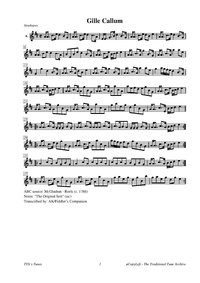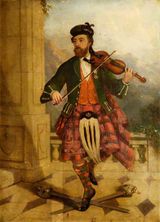Template:Pagina principale/Vetrina

Played by: Epiton
Source: Soundcloud
Image: James Scott Skinner's brother, Alexander "Sandy" Skinner, performing a sword dance while accompanying himself on the fiddle, c. 1880's.

One of the core tunes of Scottish repertoire, sometimes published (especially in older collections) with numerous variation sets. The earliest record of the tune is in David Young's Drummond Castle Manuscript, Part 2 (1734, No. 10), in the possession of the Earl of Ancaster at Drummond Castle, sometimes called the Duke of Perth MS because of the inscription. Young also included the tune in one of his subsequent manuscript collections, The MacFarlane Manuscript, Part 2 (c. 1740, No. 101, p. 236), albeit under the title "Cuttie Spoon." John Glen (1891) finds the reel in Robert Bremner's 2nd Collection or Scots Reels or Country Dances (London, 1768, p. 108) under the title "Keelum Kallum taa fein." "Gillie Callum" retained its popularity into the next century, and J.S. Skinner, who was a dancing master as well as a celebrated violinist, taught the dance at such places as Elgin and Balmoral (where among other dances he had four children dance Gillie Callum "in a masterly style, such as has not been witnessed in this locality before").
...more at: Gillie Callum - full Score(s) and Annotations
X:1 T:Cuttie Spoon T:Gillie Callum M:C| L:1/8 B:David Young – “A Collection of Scotch Airs with the latest Variations Book II” B:AKA - The McFarlane Manuscript (c. 1741, No. 191, p. 236) F: https://rmacd.com/music/macfarlane-manuscript/collection/pdfs/cuttie_spoon.pdf N:The Society of Antiquaries of Scotland K:Amix A/A/A T(cA) d2 (BG)|A/A/A T(cA) (c/d/e) T(cA)|(c/d/e) T(cA) d2 (BG)|A/A/A T(cA) e2 (cA):| |:Tceeg d2 BG|Tceea e2 TcA|(c/d/e) (f/g/a) d2 BG| (c/d/e) (f/g/a) (ef/g/) ae|gg a/g/f/e/ d2 BG|(c/d/e) (f/g/a) Te2 (cA):| |:E/E/E (BE) dGBG|A/A/A T(cA) eATcA|eATcA dGBG|A/A/A TcA eATcA:| |:ceeg dgBG|ceea eacA|eacA dgBG| eaca eacA|gg a/g/f/e/ dgBG|ceea eacA:|]
